Garden Flies: How to Get Rid of Flies in a Vegetable Garden
-
Helpful Products from Gardens Alive!
-
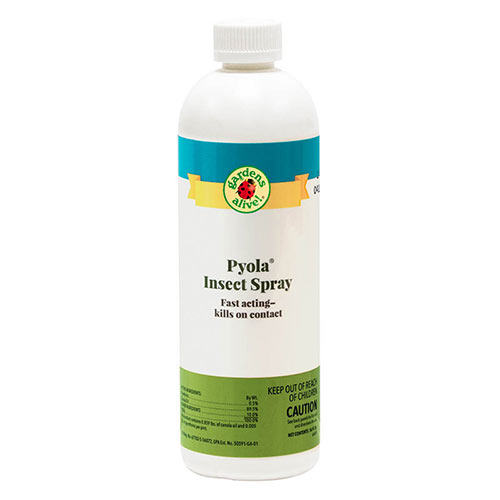 Pyola® Insect Spray
Pyola® Insect Spray
Buzzing flies can be annoying--and flies in garden can be both good and bad. Varying in size and appearance, flies can be useful as pollinators, predators, parasites and prey--and they can also bite and spread disease.
For many gardeners, insect control is a balancing act. They want to attract beneficial flies to the garden and to get rid of nuisance flies. Read on to learn more about how to get rid of flies in vegetable garden.
What Are Garden Flies?
Vegetable gardens are mini-ecosystems, and flies are part of it. With more than 100,000 species of flies in the world, the flies in your garden may be nuisance or filth flies (such as the common house fly, horse flies and fruit flies); they may be beneficial insects or pollinator flies (such as tachnid flies and flower flies); and they may be plant-eating flies (such as whiteflies, fungus gnats and fruit flies).
Before getting rid of garden flies, first determine what types of flies you have in the garden. Inspect your plants closely to see if the flies are eating your plants.
Are Flies Good in the Garden?
Some types of flies are good in the garden, and even essential for the pollination of flowers and vegetables. Like bees, flies are pollinators--and flies often pollinate plants that bees may not. Flies also play a role in the food chain. Some feed on insects while others are food for birds and other insects.
Some flies, though, are undesirable in the garden. They can spread disease as they fly from plant to plant. Do flies eat plants? Yes, some do. Whiteflies are some of the most common flies that feed on plants.
What Are Flies Good For?
Some flies, such as house flies, can be annoying as they buzz about and visit your outdoor picnic. They can also spread disease as they fly from serving platter to serving platter. But many flies are good to have around because flies can pollinate plants, eat undesirable insects and provide food for birds.
Do Flies Eat Plants?
Plenty of people wonder how to get rid of flies in vegetable gardens. This is mainly because they are worried about their vegetables being eaten or falling prey to non-beneficial insects. Some flies eat plants. Whiteflies feed on lots of different plants. Other common plant-eating flies found in the vegetable garden are fruit flies, bulb flies and fungus gnats. Flies may feed on the plants, roots or fruits.
How Do You Get Rid of Flies in the Garden?
If you have flies in the garden, the first step is to identify what types of flies you have and if they are causing damage to your plants, the fruits or the roots. Some of the common ways to get rid of flies in the garden are:
• Sticky traps: These adhesive strips or traps often lure flies with a pheromone or other smell and trap them with an adhesive.
• Insect sprays: Many types of fly sprays are available. Some repel while others kill the flies. When using insect sprays to get rid of flies in the garden, be sure to follow the instructions on the label.
• Beneficial insects: Many mail-order catalogs sell beneficial insects that prey on flies.
• Fans: If flies are congregating near a picnic or patio, you can use an electric fan to discourage them from visiting. Flies don't care for the air movement.
• Keep fly attractants away from the garden: Many types of flies are drawn to food and manure. Keeping the compost pile, the manure pile, and the household trash away from the garden could help keep flies out of the garden.
How Do You Keep Flies off of Hydrangeas and Other Flowers?
Flies seem to love hydrangea bushes and will gather on their flowers. (They like other flowers in the garden, too). One of the best ways to keep flies off of hydrangea and other flowers is to use natural repellents such as clove oil, eucalyptus oil or citronella oil.Expert Advice
Beneficial Bugs? Or Filthy Flies?Q. Alison in Philadelphia (specifically south of Fitler Square; north of Devil's Pocket and near the Schuylkill River Trail) writes: "I have a patio garden with pots, railing planters and a raised bed filled with hydrangeas, petunias, roses, impatiens, gardenias, pumpkin vines, a hibiscus, butterfly bush, two tomato plants, and a few herbs.
"I'm trying to attract 'good bugs' and pollinators. I've seen a few bees in the front, one butterfly out back, and many birds. The plants are all doing well—I even had a red tomato before the 4th of July! But I have an abundance of flies! The residents of a nearby apartment building always put their trash out several days early, which I know can attract flies; but the flies in my back patio are relentless."
Alison continues: "I bought fly traps and have caught literally hundreds of flies within a few days. But now I'm wondering: is this paradoxically attracting even more flies to my garden? And if I want 'good bugs', do I have to buy them online to release in the spring? Full disclosure: I have a dog and dispose of some of his waste in our trashcan, but that's not where the flies are; they're around the plants."
A. Let's analyze the young lady's missive. What's missing in her communication that is ordinarily the prime topic in an email to the show? (Besides insincere praise to the host in the hopes of getting her question picked.)
Here's a clue: How does she say that her plants are doing? It sounds like her plants are just fine, right? Wait a minute! Am I now going to tell you that flies are good?!
Everything on this planet is good for something, even me. Now, there are two possibilities here. One is that these are just nasty flies that can often be a plague in urban areas. Our beloved originating station WHYY is only three blocks from where the Declaration of Independence was drafted, and history tells us that Philadelphia was so under siege by flies that summer that the Founders had to keep the windows closed despite the stifling heat that year.
And the other reason?
The other reason is more like two reasons. There are over 150,000 species of what are called 'flies' in the world of entomology; and pretty much all of them are or can be pollinators. We've talked in the past about how flies pollinate the native Paw-Paw fruit, and in the tropics, there would be no chocolate without pollination by flies! (My, that sounds good: Chocolate covered Paw-Paws. Yum!)
Anyway, all members of the fly family—including mosquitoes—can be effective pollinators. There's even a sub-group of flies called "Flower Flies"—members of the Syrphid Fly family—that are famed pollinators; second only to bees.
So: do I think that's what she has?
I'd love to say yes, but a lot of the beneficial flies don't look like houseflies—many of them are imitators of bees and wasps; mimicking their appearance to deter predators.
However, there are also a lot of fly-like beneficial insects in the very-large fly family. The Tachnid Fly is in everyone's beneficial Top Ten—as is the Robber Fly. Then there's the Soldier Fly, Hoverfly, and the Pollen Flies. And again, even the common house fly is a well-known pollinator.
Now—I mentioned Paw Paws and chocolate before; they NEED flies for pollination. What about the plants she has growing? A little research dashed that hope. Of her list, only roses have a large percentage of fly pollinators.
So what's the chance that these are just nuisance flies?
"Just"? Small; all flies are going to pollinate flowers (and she even notes that she has lots of blooms despite few bees.) But in general? Yes, especially in the City; especially where neighbors are careless about their trash; and especially near large bodies of water, as she is to the Schuylkill river.
So what's an urban gardener to do?
I hate to say it, but number one is to dime out her neighbors. You can't have trash sitting out close to a week in advance—especially in the summer. Second, keep up with the traps. As she noted, fly traps are highly effective. Third, use oscillating fans to keep the flies at bay when you eat and drink—or just plain sit—outside. And most importantly, focus on keeping the flies out of the house…
…Because in the garden, they will help pollinate plants and won't directly harm any plants.
In addition, she should avoid using any kind of manure or stinky fertilizers, as they could attract flies. She should also be diligent about cleaning up damaged tomatoes and the like. And read some of the 'bee' and 'beneficial' articles in our archives here at Gardens Alive and adopt some of the recommended attraction techniques.
-
Helpful Products from Gardens Alive!
-
 Pyola® Insect Spray
Pyola® Insect Spray



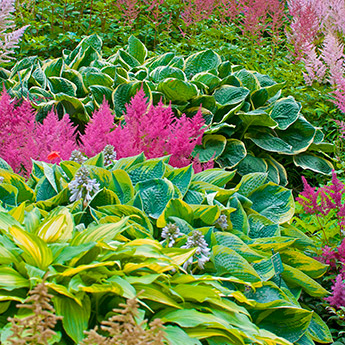

 Gardens Alive! & Supplies
Gardens Alive! & Supplies